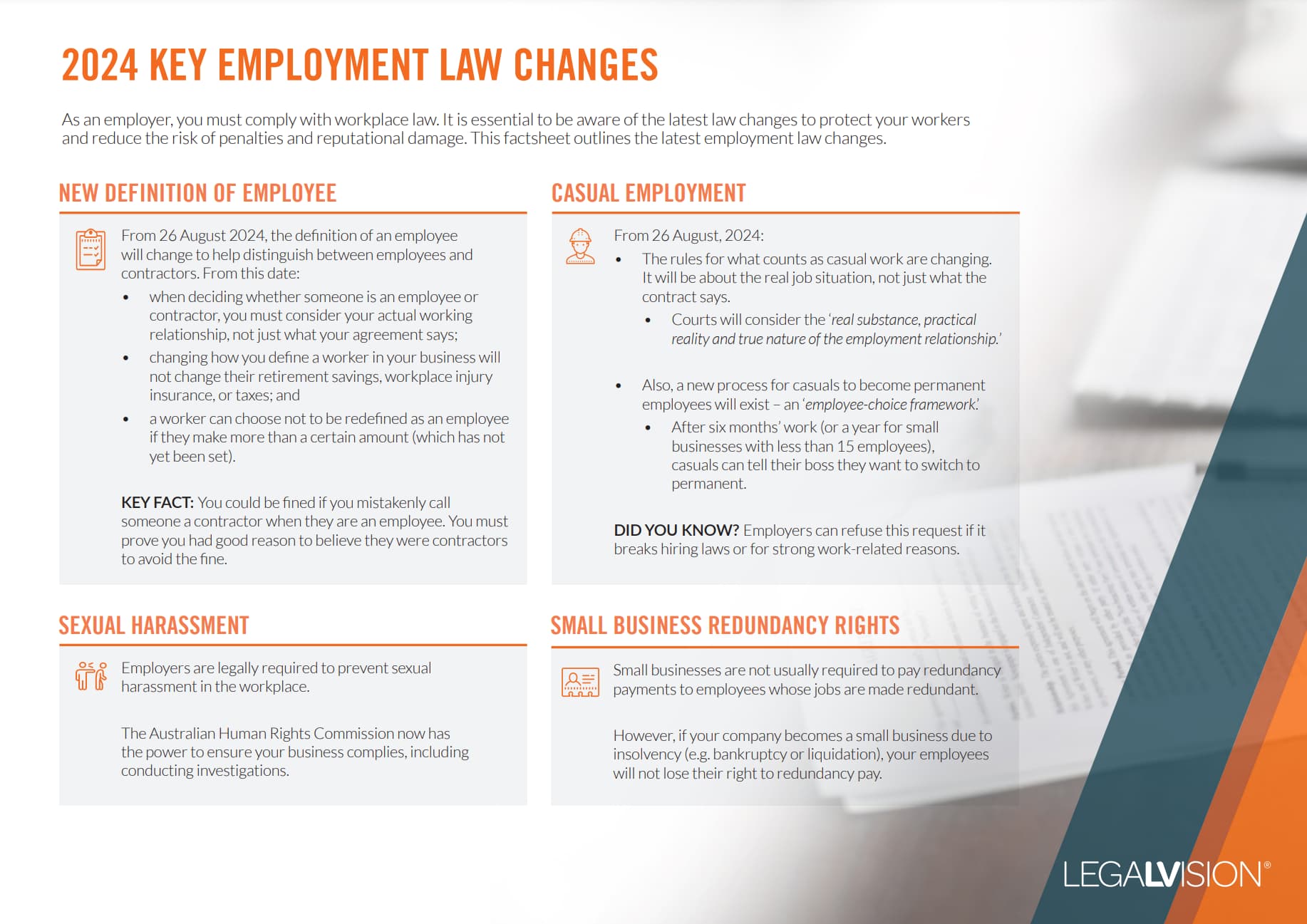As a retail business owner, it is essential to understand and apply Australian employment law correctly. A lack of adequate planning can result in failing to satisfy the myriad of duties imposed by labour laws. Retail businesses have the same obligations as other employers, primarily found in the Fair Work Act 2009. Additionally, the modern awards system prescribes minimum pay rates and other entitlements such as leave. This article will highlight key considerations for your retail business when hiring and retaining employees.
Types of Retail Employees
There are different kinds of employees, and it is worth knowing the difference between permanent workers, being full-time and part-time, and casuals. A full-time worker works an average of 38 ordinary hours per week, while a part-time worker puts in fewer than 38 hours per week. A casual employee has no entitlement to predictable hours of work.
At the time of engagement, you must inform employees about the basis on which they are hired. You should list their form of employment in the employment contract.
National Employment Standards
Once you have confirmed the details of the situation, you must provide all employees with a copy of the Fair Work Information Statement explaining their guaranteed entitlements before, or at a reasonable time after, hiring. The National Employment Standards include entitlements such as annual, personal, carer, and parental leave.
You must provide casual employees with a copy of the Casual Employment Information Statement. This statement outlines the rights of casual employees.
Continue reading this article below the formAwards and Enterprise Agreements
Additionally, you may negotiate employee entitlements through individual contracts or register an enterprise agreement that applies to all employees. This is useful if you are dissatisfied with the entitlements provided in an applicable modern award. However, you cannot undermine the entitlements in awards, as they form the minimum provisions for employees.
Modern awards cover your employees’:
- pay rates, including overtime and penalty rates;
- hours of work;
- rosters;
- breaks; and
- allowances.
There are over 100 awards, so you must decide which is most suitable for each employee. An easy way of doing this is by reading the coverage clause, usually clause four, in the document. For your retail business, the General Retail Industry Award is likely to apply.
The General Retail Industry Award covers the following occupations:
- check-out operators and sales assistants;
- stock hands and shelf stackers;
- door-to-door salespersons;
- trolley collectors;
- service supervisors, department and store managers;
- tradespersons such as butchers, bakers and florists;
- employees selling travel packages to final consumers;
- back-office employees performing clerical work in a retail shop; and
- electrical device repairers.
Work Health and Safety (WHS)
It is a legal requirement in WHS legislation that employers take reasonable precautions to avoid exposing employees to risks of injury.
The steps to ensure work health and safety vary based on the circumstances and the resources of your business. It is crucial to consider the likelihood of a hazard and the degree of harm, including psychological harm that might result from it. A high magnitude of harm typically calls for a more robust protective response.
In a retail shop, injuries sometimes arise from handling heavy objects or moving furniture. To provide a workplace free of health and safety incidents, you should:
- implement adequate training and hire qualified staff;
- conduct a regular safety audit and promptly rectify identified risks;
- consult regularly with staff to help mitigate against threats; and
- check that your complaints procedure is adequate to detect problems.
In some states, a company director may be personally liable for breaches of health and safety duties. You can protect yourself by showing that you have acted honestly and fulfilled your duty of care by acting diligently to organise the implementation of work health and safety obligations.
Discrimination Prevention
All aspects of the recruitment, onboarding, discipline, promotion and termination process at your business must be free from discrimination. Discrimination based on protected attributes such as race, age, or sexuality is generally not allowed. For example, you cannot take ‘adverse action’ based on age unless age is a necessary job requirement. Adverse action includes, but is not limited to:
- firing an employee;
- changing an employee’s job to their disadvantage; or
- not hiring someone.
One way to prevent discrimination is to establish processes and criteria for hiring, evaluating, and making career decisions. This ensures that decisions are based on merit rather than personal biases. For example, education programs help staff understand the importance of merit-based choices and the negative impacts of discrimination.
Another helpful tactic is fostering a culture of diversity and inclusion by recognising staff achievements and appropriate cultural traditions. This can help your employees feel valued and respected, regardless of their characteristics.

As an employer, it is essential to understand what employment laws have changed and their implications for your business — particularly the changes to the Fair Work Act 2009 through the new Closing the Loopholes legislation.
Key Takeaways
As a retail business owner, it is important that you understand and abide by labour laws when hiring and managing employees. This includes understanding the minimum entitlements that you owe your employees, as outlined in the applicable modern award. You should also consider best practice guidelines for recruitment, onboarding, work health and safety and equal opportunity. Having internal policies to address the employer-employee relationship will ensure your organisation runs smoothly.
If you would like assistance with employment law for the retail sector, our experienced employment lawyers can assist as part of our LegalVision membership. For a low monthly fee, you will have unlimited access to lawyers to answer your questions and draft and review your documents. Call us today on 1300 544 755 or visit our membership page.
We appreciate your feedback – your submission has been successfully received.











